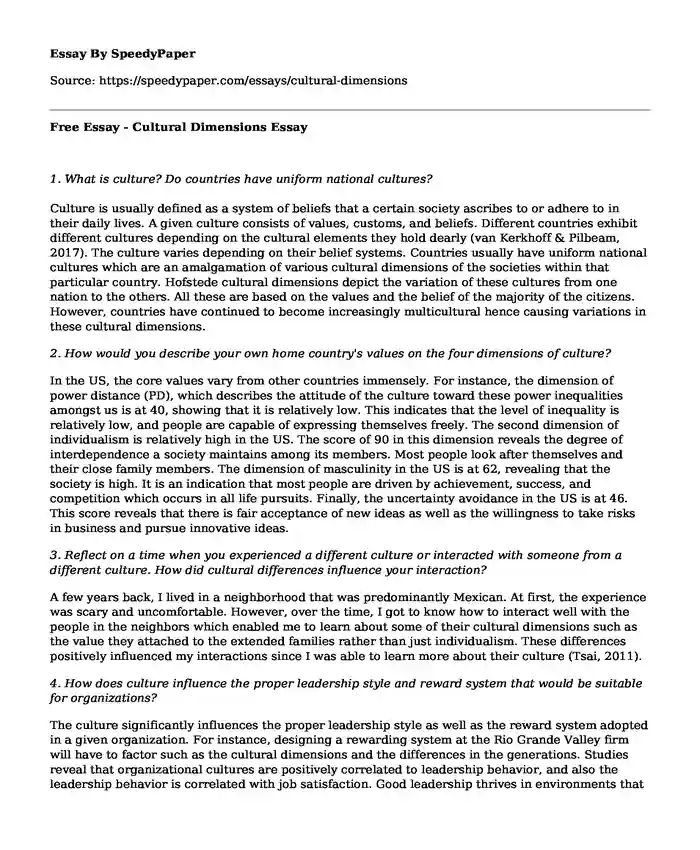
| Type of paper: | Essay |
| Categories: | Multiculturalism Organizational culture Intercultural communication |
| Pages: | 3 |
| Wordcount: | 732 words |
1. What is culture? Do countries have uniform national cultures?
Culture is usually defined as a system of beliefs that a certain society ascribes to or adhere to in their daily lives. A given culture consists of values, customs, and beliefs. Different countries exhibit different cultures depending on the cultural elements they hold dearly (van Kerkhoff & Pilbeam, 2017). The culture varies depending on their belief systems. Countries usually have uniform national cultures which are an amalgamation of various cultural dimensions of the societies within that particular country. Hofstede cultural dimensions depict the variation of these cultures from one nation to the others. All these are based on the values and the belief of the majority of the citizens. However, countries have continued to become increasingly multicultural hence causing variations in these cultural dimensions.
2. How would you describe your own home country's values on the four dimensions of culture?
In the US, the core values vary from other countries immensely. For instance, the dimension of power distance (PD), which describes the attitude of the culture toward these power inequalities amongst us is at 40, showing that it is relatively low. This indicates that the level of inequality is relatively low, and people are capable of expressing themselves freely. The second dimension of individualism is relatively high in the US. The score of 90 in this dimension reveals the degree of interdependence a society maintains among its members. Most people look after themselves and their close family members. The dimension of masculinity in the US is at 62, revealing that the society is high. It is an indication that most people are driven by achievement, success, and competition which occurs in all life pursuits. Finally, the uncertainty avoidance in the US is at 46. This score reveals that there is fair acceptance of new ideas as well as the willingness to take risks in business and pursue innovative ideas.
3. Reflect on a time when you experienced a different culture or interacted with someone from a different culture. How did cultural differences influence your interaction?
A few years back, I lived in a neighborhood that was predominantly Mexican. At first, the experience was scary and uncomfortable. However, over the time, I got to know how to interact well with the people in the neighbors which enabled me to learn about some of their cultural dimensions such as the value they attached to the extended families rather than just individualism. These differences positively influenced my interactions since I was able to learn more about their culture (Tsai, 2011).
4. How does culture influence the proper leadership style and reward system that would be suitable for organizations?
The culture significantly influences the proper leadership style as well as the reward system adopted in a given organization. For instance, designing a rewarding system at the Rio Grande Valley firm will have to factor such as the cultural dimensions and the differences in the generations. Studies reveal that organizational cultures are positively correlated to leadership behavior, and also the leadership behavior is correlated with job satisfaction. Good leadership thrives in environments that promote collaboration and communication, which make it possible to accomplish the organizational goals (Osland, Devine & Turner, 2015).
5. Imagine that you will be sent to live in a foreign country different from your own in a month. What are the types of preparations you would benefit from doing
Given a chance to live in a foreign country in a month would require thorough preparation. First, I would learn the cultural difference between the two countries. I would ensure that I have exhaustively factored these differences since there is no room for mistakes. Secondly, I would ensure that I have learned basic etiquette like greetings, gestures, and signs. These are some of the factors that may bring about conflict while living there. I would also learn about taboos and behaviors that anger the natives so as to avoid them. Lastly, I would devote myself to learning the language, especially the common phrases used like greetings, please, thank you, and welcome, among others (van Kerkhoff & Pilbeam, 2017).
References
Osland, J., Devine, K., & Turner, M. (2015). Organizational behavior. Wiley Encyclopedia of Management, 1-5.
Tsai, Y. (2011). Relationship between organizational culture, leadership behavior, and job satisfaction. BMC health services research, 11, 98. doi:10.1186/1472-6963-11-98
van Kerkhoff, L., & Pilbeam, V. (2017). Understanding socio-cultural dimensions of environmental decision-making: A knowledge governance approach. Environmental Science & Policy, 73, 29-37. https://doi.org/10.1016/j.envsci.2017.03.011
Cite this page
Free Essay - Cultural Dimensions. (2023, Feb 10). Retrieved from https://speedypaper.com/essays/cultural-dimensions
Request Removal
If you are the original author of this essay and no longer wish to have it published on the SpeedyPaper website, please click below to request its removal:
- Free Essay: Computer Use by Children and Adolescents Be Carefully Supervised and Monitored
- White Revolution in Iran, Free Essay for Your Benefit
- Free Essay: Effects of Cell Phones and Email on Relationships and Communication
- Free Essay Example about Globalizing Governance and Non-Profit Program
- Free Essay on the Advertising Campaign for Inpera Hybrid Timepieces Collection
- Essay Example on the Impacts of Technology
- Paper Example: The Various Forms of Racism in To Kill a Mockingbird
Popular categories




